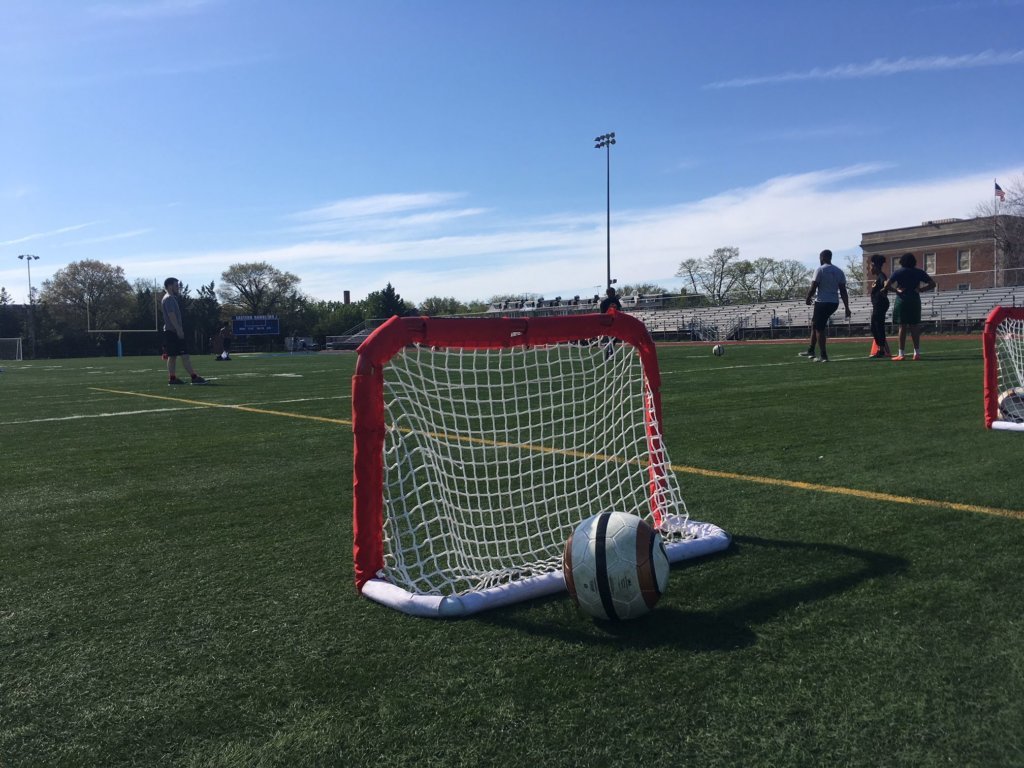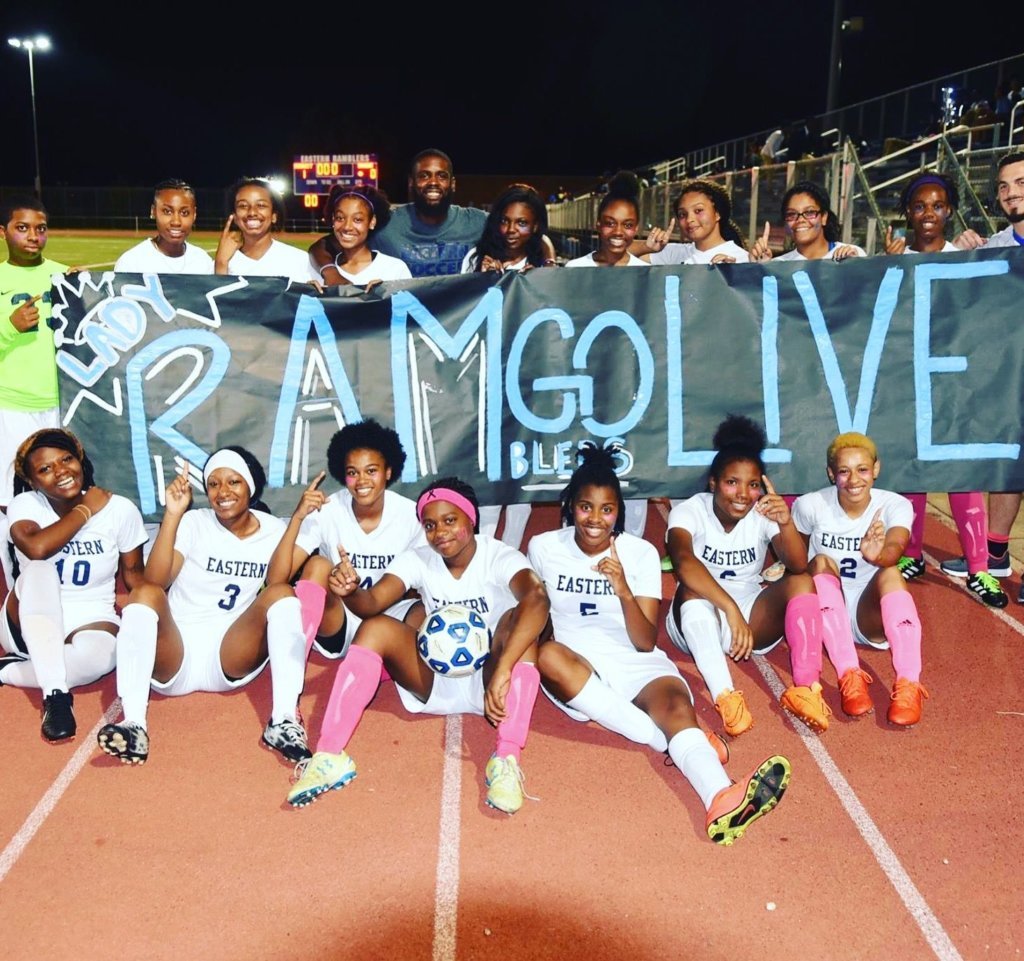WASHINGTON — “They all call me ‘Ma.’”
“They” are the students of Eastern High School, The Pride of Capitol Hill, the ornate brick fortress along the final, gentle slope of East Capitol Street as it eases away from Washington toward RFK Stadium and the Anacostia River. “Ma” is Patricia Briscoe, a 43-year veteran of the school system, nearly all of those years spent in athletics, who is retiring from her post as Eastern’s director of athletics this summer.
Briscoe has seen dramatic changes in her time with DC Public Schools, as charter schools siphon budgets and private schools swipe away the best athletes. And yet, she’s leaving Eastern with a burgeoning athletic program, one that has seen a particular rise in both participation and success in girls’ sports over the last few years, and with a handful of coaches who understand, as she does, the extra effort needed to pull it all off.
Raised in the Fairfax Village neighborhood of Southeast D.C., Briscoe’s career began straight after she graduated from Hampton University in 1975, as she returned to her alma mater, Anacostia High School. Right away, she was approached and told that they needed a girls basketball coach, or they wouldn’t be able to field a team. Never mind that she had never played; never mind that she wasn’t a physical education teacher. Briscoe took the gig and never looked back.
By 1989, she moved to the athletic office at DCPS, where she worked for 22 years, all the way up to assistant director. Eventually, in 2013, she ended up at Eastern to teach math. But with the school functioning without a real, true athletic director, once again Briscoe stepped into the void.
She lamented the out-of-date weight room, the need for a high jump pit. But there were more pressing issues — kids without athletic shoes, or other equipment to play their sports. She and her coaches would often dip into their own pockets to help cover needs, but those weren’t permanent solutions.
“You really never have enough funding for your program,” said Briscoe. “I think the biggest challenge really is knowing that you need some more things for your kids and you can’t get them.”
Nevertheless, as she always has, Briscoe and her coaches have figured out how to make things work, all while adding successful teams to the department. Girls flag football and soccer teams were both added into the fold two years ago. But just like Briscoe at the start of her career, the man put in charge of the soccer team, Alex Clark, had no experience with the sport, having grown up playing other things. But he shared Briscoe’s commitment beyond the playing field.
“They’re just dedicated people,” said Briscoe. “All my coaches put in beyond the expected time. All of them mentor their kids. All of them touch parents. All of them feel like their job is more than just coaching. And as a result of that, we’ve been lucky, we’ve been successful, we’ve grown.”

Being a coach at Eastern means facing obstacles that counterparts in wealthier ZIP codes don’t encounter. For Clark, that has meant not simply corralling students after class to make sure they’re at practice, but making last-minute trips before games to grab cleats and shin guards to make sure they can actually play. Thankfully, he’s been able to fill the equipment void thanks to Leveling The Playing Field, a nonprofit out of Silver Spring that distributes used equipment to teams in need.
“For me it was really eye-opening, because you kind of turn into a surrogate father, in a sense,” said Clark.
Originally from Connecticut, Clark is a physical education teacher who also coaches the JV boys basketball in addition to varsity girls soccer. Perhaps the biggest new challenge he faced was that many of the girls he was recruiting from his classes to join the team had never even played the game before high school. He had to overcome the stigma of how the sport is perceived: as something for the white kids up in Northwest, not at Eastern.
“I’m not the type that would play soccer, because it seemed like somebody else’s sport, not mine,” said Charnay Kasson, now a team captain heading into her junior year. “So for us to actually do this is a big accomplishment, a big change.”
Kasson had been a track runner and volleyball player in middle school. Others like Paris Whealton, one of the first to earn a partial college soccer scholarship, had played basketball. Only a handful had any kind of organized soccer experience before stepping on the field together at Eastern.
“Most of them came into high school never thinking they were going to play soccer,” said Clark.
For Clark, there was also the challenge of coaching girls for the first time, many of whom were hesitant at first about what, exactly, they were signing up for.
“Teaching girls how to be a part of an actual team and getting them to understand the importance of that camaraderie was one of the biggest challenges.”
While boys are helped along and encouraged to find themselves through sports, oftentimes girls are not supported with the same enthusiasm.
“One of the things we make sure of is that the girls know they are strong, confident people,” said Briscoe. “We’re still not pushed to participate. It’s still almost an aside. You end up having to convince people, ‘this is what you can do.’”

Ask just about anyone involved with the Eastern girls soccer team what that defining moment was that made them believe, and they’ll point to the same one. Playing with the minimum 11 players their first season, the Ramblers faced a tough test on the road at Cardozo, but snagged an early lead on a penalty kick. That held up until late in the game, when the Clerks earned a dangerous free kick deep in Eastern territory. Instinctively, the whole team — many of whom hadn’t played organized soccer until that year — lined up and formed a wall to block the shot. They did, and won the game 1-0.
“From that point on, 100 percent attendance at practice the rest of the season,” said Clark. “That just goes to show that all it takes is a little bit of motivation, and winning is a big part of that motivation.”
The team kept winning, enough to finish in the top four in the city and make the playoffs, despite its inexperience. Briscoe understands that it’s not necessarily about winning championships, but having programs that do win games, that can compete, that can offer the promise of something better to come, are instrumental to success. Eastern lost its playoff game to Wilson two years ago 9-1, a stark reminder in the differences between the programs. But the Ramblers made it back to the playoffs and the two sides squared off again this last year, with Eastern only losing 3-1.
“If you’re winning, then they want to be a part of that. And if you can convince them that’s the direction you’re heading, then a lot of times they’ll take a chance,” said Briscoe.
And while Eastern has made the playoffs each of its first two years, expanding in roster size and sending the first girls off to college with some scholarship money to Division II schools, there’s something bigger at play.
“Teams didn’t look like us — our first season, we were the first all-black team in the city,” said assistant coach and DCPS central office employee Dominic Dellorso. “Once the girls saw that, once they realized they were doing something special in the city. That was huge for them.”
Briscoe is a true believer in athletics’ ability to change lives, though not simply through the prism of the almighty athletic scholarship. She’s pragmatic about higher education — she understands a traditional four-year liberal arts or science program isn’t right for everyone. But even trades like cosmetology, plumbing, electrical work or culinary school require further training and education.
“Come to school every day ready to do your work, because athletics can be a vehicle to get you into college,” she said.
To be a part of the Eastern girls soccer team means showing up for practice every day. In order to do that, students have to show up for school every day. If kids are at school every day, their grades go up. With better grades, they might not even need an athletic scholarship to find the next step in the path of their educational journey.
That attitude has rubbed off on the Eastern team and has those like Kasson considering playing soccer at the college level, something entirely unthinkable two years ago.
“From the first year, people might think that it was so easy to get where we are now — it was not. It took a lot of hard work and dedication to get where we are now,” said Kasson.
Briscoe’s approach has also left an indelible mark on her coaches, the ones tasked with carrying her legacy forward in her retirement.
“She’s kind of been like a second mom to me, supporting me both professionally and personally,” said Clark. “She’s been instrumental just in my development as a coach and a teacher, and I couldn’t thank her any more.”
And so, even with “Ma” retiring, Eastern has a group of coaches like Clark in place to carry on her ideals, her spirit of going above and beyond the simple calls of duty.
“Most people who really are chosen to be teachers — not so much who choose to teach, but who have been chosen to be teachers — have already committed to it,” said Briscoe. “If you don’t love children, this is not the place to be. It’s not your chosen profession. It’s just something you’re doing.”






